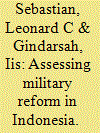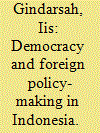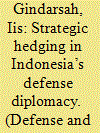| Srl | Item |
| 1 |
ID:
124524


|
|
|
|
|
| Publication |
2013.
|
| Summary/Abstract |
This article seeks to assess the magnitude of military reform in Indonesia and its impact in establishing greater levels of professionalism within the armed forces. To this end, the authors will offer some reflections on the studies of civil-military relations and military transformation for inculcating a higher degree of military professionalism; analyse to what extent the process of military reform in Indonesia has reshaped the institutional role of the armed forces; and discern three major strategic gaps in Indonesia's military reform, namely the "legal loopholes and regulation vacuum," the "shortcomings of democratic civilian control," and the "defence-economic gap." This article asserts that military professionalism will grow more substantially depending on the ability of civilian elites to exercise effective control over the military and the capacity of the government to transform the military establishment keeping pace with strategic challenges and operational requirements.
|
|
|
|
|
|
|
|
|
|
|
|
|
|
|
|
| 2 |
ID:
117736


|
|
|
|
|
| Publication |
2012.
|
| Summary/Abstract |
This article studies the impact of domestic politics on Indonesia's foreign policy-making. Serving as a non-permanent member of the United Nations Security Council (UNSC) from 2007 to 2008, Indonesia voted on two key resolutions concerning the Iranian nuclear issue. While approving international sanctions against Iran under UNSC Resolution No. 1747, the Indonesian government abstained from voting on Resolution No. 1803 which imposed additional sanctions on Tehran. This article argues that the country's changing response to the Iranian nuclear issue was a consequence of domestic opposition. The case study specifically identifies the Muslim-majority population, religious mass organizations, and political parties, as key factors which weighed upon the "risk calculus" behind Indonesia's foreign policy formulation. The article concludes that while the executive still drives the countrys foreign policy, Indonesias Parliament and social-political groups have gained new powers to influence the government into changing or even reversing existing policies.
|
|
|
|
|
|
|
|
|
|
|
|
|
|
|
|
| 3 |
ID:
136669


|
|
|
|
|
| Summary/Abstract |
The Yudhoyono administration appeared to rely on two distinct strategies to preserve national and international security. At one level, it relies on multilateral –oriented diplomacy to institutionalize liberal norms and mechanism including confidence building, cooperative security and peaceful conflict settlement in order to build a cohesive international order. At another level, the Indonesian government sought to modernize to country’s military capabilities and enhance its autonomy for arms.
|
|
|
|
|
|
|
|
|
|
|
|
|
|
|
|
| 4 |
ID:
148353


|
|
|
|
|
| Summary/Abstract |
With the rapid pace of regional arms modernization and unresolved territorial disputes, Indonesia is increasingly susceptible to the impact of emerging great power rivalry in Asia-Pacific. Rather than pursuing a robust military build-up, Indonesian policy-makers assert that diplomacy is the country’s first line of defense. This article argues that defense diplomacy serves two agenda of Indonesia’s hedging strategy – strategic engagement and military modernization. This way, Indonesian defense and security officials seek to moderate the impact of geopolitical changes while maintaining the country’s defensive ability against regional uncertainties.
|
|
|
|
|
|
|
|
|
|
|
|
|
|
|
|